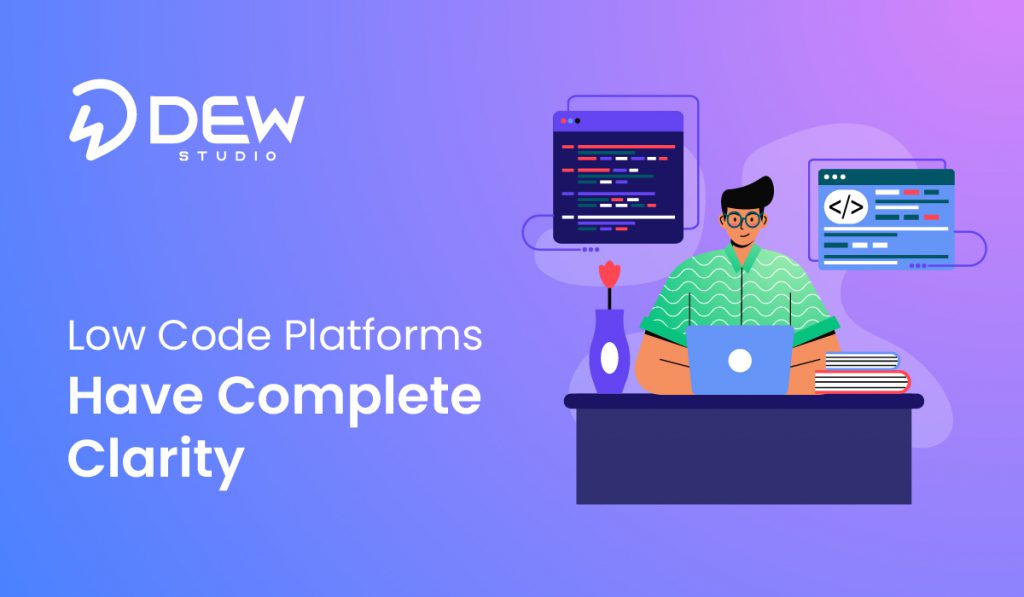
Low code application development platforms 2024 (LCADPs) are revolutionizing how businesses build and deploy software in the ever-evolving digital transformation landscape.
This blog delves into the top enterprise level of LCADPs of 2024. It will throw light on how such tools empower citizens and professional developers to make informed decisions for the organization’s digital journey.
Understanding Low Code Application Development Platforms
Defining LCADPs and their Role in Software Development
In brief, the low code is defined as a graphical, drag-and-drop development environment that minimizes the need for traditional hand-coding.
They provide a visual interface for building applications, utilizing pre-built components, templates, and reusable modules. This approach significantly streamlines the development process, enabling businesses to build applications faster and with fewer resources.
Benefits of Adopting DEW Studio for Businesses
The adoption of DEW Studio offers a myriad of benefits to businesses, including:
Accelerated development: It enables rapid application development, reducing time-to-market for new solutions.
Reduced costs: Minimizing coding requirements lowers the development cost and increases productivity.
Empowered citizen development: Business users can easily create applications without extensive technical expertise, fostering innovation and agility.
Enhanced agility: Tool facilitates rapid adaptation to changing business needs and market demands.
Improved collaboration: LCADPs promote cooperation between business and IT teams, breaking down silos and fostering innovation.
Key Features and Capabilities of Enterprise Grade Low Code Platform
The enterprise-grade platform offers a comprehensive set of features and capabilities, including:
Visual development environment: Drag-and-drop interfaces for building applications without extensive coding.
Pre-built components and templates: Reusable modules to accelerate development and ensure consistency.
Data integration capabilities: Integration with existing data sources and enterprise systems.
Deployment and management tools: Automated application deployment, governance, and maintenance.
Security and compliance features: Robust security measures to protect sensitive data and comply with regulations.
Everyday Use Cases for Low Code Tools in Various Industries
This tool is applicable across multiple industries and business functions, including:
Customer relationship management (CRM): The platform offers the right solution to create custom CRM that allows easy management & customer interactions.
Business process automation (BPA): Automating repetitive tasks and streamlining workflows.
Data management and analytics: Creating data dashboards and reporting tools for insights.
Mobile app development: Building native and cross-platform mobile applications.
Internal collaboration tools: Developing project management, communication, and knowledge-sharing portals.
Most Popular Enterprise-Level Low Code Platforms in 2024
There is an exponential rise in the expansion of the Low Code landscape. Therefore, a tool must be par on every parameter to top the list of popular Low Code platforms. The insightful research brings us to one of the leading enterprise-level LCADPs of 2024:
DEW Studio: A Comprehensive and Scalable Software for Complex Enterprise Applications
DEW Studio is a robust Low Code application development platform designed for building complex business applications. It offers complete features, including a user-friendly visual interface, extensive pre-built components, and full integration capabilities. There is no doubt that the tool provides flexibility and scalability for large-scale enterprise deployments.
User-Friendly
For its user-friendly interface and simplified development process, it is becoming ideal for citizen developers. It provides various mobile app development tools, enabling businesses to create and deploy native and cross-platform mobile applications quickly.
Versatile Integrated Ecosystem
The easy integration of the tool enables businesses to leverage their existing Microsoft investments and streamline workflows across different platforms.
Robust Process Automation and Case Management
A well suited for business process automation (BPA) and case management applications. It provides powerful workflow modelling and automation capabilities, enabling businesses to automate repetitive tasks, improve efficiency, and enhance customer service.
Cloud-Based with a Focus on Data Management
A robust cloud-based architecture offers scalability, flexibility, and ease of deployment. It provides advanced data management capabilities, enabling businesses to integrate, analyze, and visualize their data from various sources.
Future of Low Code Tool
Emerging Trends in the Low Code Space and Impact on Software Development
With new and innovative trends, the shaping of software development future is becoming convenient.
Here are some of the key trends to watch:
Role of Angular Low Code Platform in Driving Digital Innovation and Business Agility
Low-code app Development Platforms are playing a pivotal role in driving digital innovation and business agility by enabling enterprises to:
Rapid application development and deployment to meet evolving market demands and customer needs.
Empower users not from a technical background to create applications, work on innovation and collaborate across the organization.
Automate repetitive & monotonous tasks and keep the workflows steady, eventually improving efficiency and productivity.
Enhance data-driven decision-making by facilitating data integration and analysis.
Reduce time to bring new products & services into the market, gaining a competitive edge.
Conclusion:
Low Code tools transform the enterprise software development landscape, empowering businesses to accelerate innovation, enhance agility, and achieve digital transformation goals. By embracing LCADPs and leveraging their capabilities effectively, enterprises can unlock new opportunities for growth and success.
Here are Some of the Benefits of LCADPs for enterprises
Reduced Development Costs: It can help businesses to cut their expenses by up to 60%.
Increased Agility: It can help businesses develop and deploy applications faster than traditional methods.
Improved Collaboration: Low Code can help businesses enhance the cooperation between technical and non-technical users.
Enhanced Innovation: The tool can help businesses foster innovation by empowering non-technical users to create applications.
Start with a Pilot Project: Implement DEW Studio for a small, well-defined project. This will help you learn the ropes of the Low-Code and identify any potential challenges.
Train Your Users: Make sure that your users are trained on how to use the Development Tools. This will help them get the most out of the LCADP and avoid making mistakes.
Get buy-in from your executives: Ensure your executives are on board with your initiative. This will help you to get the resources and support you need to be successful.
DEW Studio is a powerful tool that can help enterprises to achieve their digital transformation goals. By understanding the key trends in the application development space and following the tips for success, you can implement a plan to help your business innovate, be agile, and succeed.


